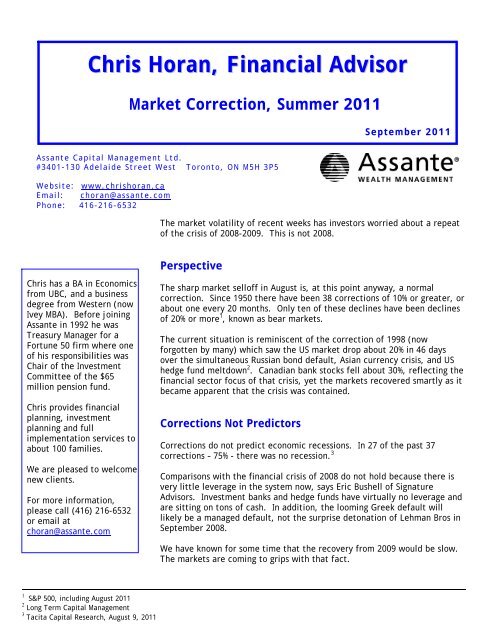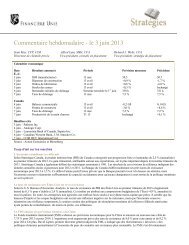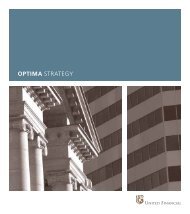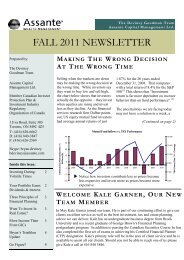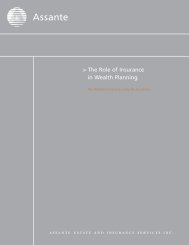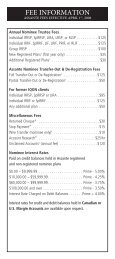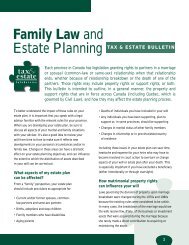Chris Horan, Financial Advisor - Assante Wealth Management
Chris Horan, Financial Advisor - Assante Wealth Management
Chris Horan, Financial Advisor - Assante Wealth Management
Create successful ePaper yourself
Turn your PDF publications into a flip-book with our unique Google optimized e-Paper software.
<strong>Chris</strong> <strong>Horan</strong>, <strong>Financial</strong> <strong>Advisor</strong><br />
Market Correction, Summer 2011<br />
September 2011<br />
<strong>Assante</strong> Capital <strong>Management</strong> Ltd.<br />
#3401-130 Adelaide Street West Toronto, ON M5H 3P5<br />
Website: www.chrishoran.ca<br />
Email: choran@assante.com<br />
Phone: 416-216-6532<br />
The market volatility of recent weeks has investors worried about a repeat<br />
of the crisis of 2008-2009. This is not 2008.<br />
Perspective<br />
<strong>Chris</strong> has a BA in Economics<br />
from UBC, and a business<br />
degree from Western (now<br />
Ivey MBA). Before joining<br />
<strong>Assante</strong> in 1992 he was<br />
Treasury Manager for a<br />
Fortune 50 firm where one<br />
of his responsibilities was<br />
Chair of the Investment<br />
Committee of the $65<br />
million pension fund.<br />
<strong>Chris</strong> provides financial<br />
planning, investment<br />
planning and full<br />
implementation services to<br />
about 100 families.<br />
We are pleased to welcome<br />
new clients.<br />
For more information,<br />
please call (416) 216-6532<br />
or email at<br />
choran@assante.com<br />
The sharp market selloff in August is, at this point anyway, a normal<br />
correction. Since 1950 there have been 38 corrections of 10% or greater, or<br />
about one every 20 months. Only ten of these declines have been declines<br />
of 20% or more 1 , known as bear markets.<br />
The current situation is reminiscent of the correction of 1998 (now<br />
forgotten by many) which saw the US market drop about 20% in 46 days<br />
over the simultaneous Russian bond default, Asian currency crisis, and US<br />
hedge fund meltdown 2 . Canadian bank stocks fell about 30%, reflecting the<br />
financial sector focus of that crisis, yet the markets recovered smartly as it<br />
became apparent that the crisis was contained.<br />
Corrections Not Predictors<br />
Corrections do not predict economic recessions. In 27 of the past 37<br />
corrections – 75% - there was no recession. 3<br />
Comparisons with the financial crisis of 2008 do not hold because there is<br />
very little leverage in the system now, says Eric Bushell of Signature<br />
<strong>Advisor</strong>s. Investment banks and hedge funds have virtually no leverage and<br />
are sitting on tons of cash. In addition, the looming Greek default will<br />
likely be a managed default, not the surprise detonation of Lehman Bros in<br />
September 2008.<br />
We have known for some time that the recovery from 2009 would be slow.<br />
The markets are coming to grips with that fact.<br />
1 S&P 500, including August 2011<br />
2 Long Term Capital <strong>Management</strong><br />
3 Tacita Capital Research, August 9, 2011
Page 2<br />
Portfolio Designed to Take It<br />
Your portfolios are designed to withstand this<br />
sort of turbulence. Clients that are withdrawing<br />
regularly have bonds and other conservative<br />
income investments that are designed to<br />
generate cash flow. The equity component of<br />
your portfolio is similarly conservative: we have<br />
almost zero direct exposure to Europe, for<br />
instance.<br />
One level down, your investment managers have<br />
been positioned conservatively since April and<br />
May: Eric Bushell (Signature <strong>Advisor</strong>s) has been<br />
15% cash, less than 50% equities and has had<br />
about 4% gold bullion. You will find that most,<br />
if not all, of the individual components of your<br />
portfolio have declined significantly less than<br />
the markets they are invested in. This is the way<br />
professional money management is supposed to<br />
work.<br />
<strong>Chris</strong> <strong>Horan</strong>, <strong>Financial</strong> <strong>Advisor</strong><br />
US Companies Solid<br />
Many companies such as Boeing, Caterpillar, and<br />
DuPont have reasonable growth prospects, are very<br />
well-run, have very strong balance sheets, and are<br />
selling at below-average valuations.<br />
US industrial companies in total held a record $1.1<br />
trillion in cash at March 2011, and are set to handily<br />
beat previous record earnings set in 2007. Let me say<br />
this again: the 500 best companies in the world are<br />
sitting on more cash, and are set to produce more<br />
profits for shareholders than at any time in recorded<br />
history.<br />
The US market is selling at a P/E (price/earnings)<br />
ratio of about 12x, vs. its long term average of 16. A<br />
P/E of 12 represents an earnings yield of over 8% -<br />
compared to a 10-year bond yield of less than 2%.<br />
This difference between bond yields and stock yields<br />
is the highest since 1951 4 .<br />
Professionals Buy not Sell<br />
These corrections are naturally unnerving for<br />
many investors, especially with 2009 so close in<br />
the rear-view mirror. However, professional and<br />
other experienced investors have trained<br />
themselves to stand against the anxiety of price<br />
declines and see corrections as opportunities.<br />
The media trumpets fear, the pros are buying.<br />
Even the crisis of 2008-9 surprised with a V-<br />
shaped rebound in market prices. People who<br />
sold into the market panic ‘waiting for the storm<br />
to pass’, locked in permanent and significant<br />
capital losses.<br />
A temporary decline is a temporary paper loss.<br />
Trading out after riding down a decline, and<br />
then missing the recovery is a permanent loss.<br />
Selling into a down market just in time for a<br />
price reversal upwards is known in the business<br />
as a ‘whipsaw’; it is considered an amateur pilot<br />
error, and is one of the main reasons individual<br />
investors lose (buckets of) money.<br />
Experienced investors know that times of fear<br />
are times to buy – not sell.<br />
Notes on US Manufacturing<br />
While the immediate attention is on Europe, fully half<br />
of the entire world is growing strongly as more and<br />
more people are enjoying the benefits of a market<br />
economy.<br />
Country<br />
Population<br />
(millions) 2011 GDP 5<br />
Chile 16 +6<br />
Argentina 40 +8<br />
Turkey 73 +6<br />
Brazil 186 +4<br />
Indonesia 223 +6<br />
India 1,100 +8<br />
China 1,315 +9<br />
The US has the industrial knowledge and expertise to<br />
produce high-value goods that these markets need<br />
more of, such as jet aircraft (see below). The US<br />
remains the world’s largest manufacturer, at 21% of<br />
the world total, the same percentage it held 30 years<br />
ago. China is #2 at 15% and Japan third at 12% 6 .<br />
4 Nick Murray, a long-time industry analyst and commentator, August 2011<br />
5 2011 forecast GDP growth, yr/yr, Economist, August 2011<br />
6 Nick Murray, a long-time industry analyst and commentator, August 2011
<strong>Chris</strong> <strong>Horan</strong>, <strong>Financial</strong> <strong>Advisor</strong> Page 3<br />
The number of US manufacturing jobs has fallen from 18 million to 12 million in the last 10 years yet they<br />
produce $1.6 trillion of goods annually. If US manufacturing was on its own it would be the ninth largest<br />
economy in the world.<br />
US manufacturing workers are twice as productive as the next ten most productive economies in the<br />
world. They are so productive because they are educated and use sophisticated and expensive capital<br />
equipment – machinery and computers – to make highly engineered and technically difficult things like jet<br />
aircraft, diesel engines, and so on.<br />
US demographics are also good – its young and growing population is far superior to Europe’s older<br />
demographics. Europe may become just a sideshow as they struggle with demographic and pension<br />
headwinds.<br />
Behind the Scene – The Greeks, the Americans,<br />
and the Dreaded Double Dip<br />
Macro issues stemming from the banking crisis of 2008 continue to dominate the markets, so it is<br />
worthwhile thinking about them.<br />
This correction seems to have been triggered by the Sarkozy-Merkel ‘summit’ in early August to deal with<br />
the deepening Greece/Euro crisis, and by the media-hyped spectacle over the US debt ceiling. The post-<br />
Euro summit announcements were lame and failed to address the heart of the matter – that Greece is<br />
insolvent and the German people are refusing to underwrite additional funding.<br />
The markets were also spooked by the strength and intransigence of the Tea Party in the US Congress. We<br />
all may agree that a balanced budget is preferable to a deficit, but now is not the time for a ‘no<br />
compromise’ Tea Party balanced budget. The US economy is like an aircraft struggling to gain airspeed<br />
and in danger of stalling - the correct response is full throttle. A pullback in spending now would likely<br />
stall the plane.<br />
In economic terms, the US banking crisis and nationwide home price declines are deflationary shocks. US<br />
consumers have gone from being net borrowers to net savers, effectively pulling money out of the<br />
economy. While this is good for the economy long term, in the short term everyone running to the same<br />
side of the boat is dangerous.<br />
Rebalancing the fragile economy requires both monetary and fiscal policy to be coordinated and ‘loose’.<br />
The correct policy here is for the US government to manage the slack with short term deficit funding 7 .<br />
The US debate was unnecessary because the US economy is nowhere near the limit of its actual ability to<br />
service its debts. The US is not Greece. The US has the luxury of time to work out the balance between<br />
tax increases vs. service cuts to balance public finances. To continue the analogy, the US has altitude and<br />
fuel; Europe does not.<br />
7 Spending is economically preferable to tax reductions because a significant portion of tax savings will likely go to debt reduction.<br />
Infrastructure spending is far preferable to typical US pork-barrel spending.
Page 4<br />
<strong>Chris</strong> <strong>Horan</strong>, <strong>Financial</strong> <strong>Advisor</strong><br />
Immediate Decisions Required<br />
Elected policymakers in Europe are avoiding<br />
tough decisions by doing as little as possible as<br />
late as possible. The Greeks, having been<br />
rescued once by the French and Germans last<br />
year, are showing only lukewarm interest in<br />
bringing their economy to order. The German<br />
people have indicated that they have written<br />
their last bailout cheque to Athens.<br />
Greece’s national railway illustrates the depth<br />
of Greece’s troubles: it took in revenues of<br />
E174 million, yet spent E246 million on wages,<br />
and incredibly, had total losses of E937 million,<br />
according to the Economist. This means the<br />
railway spent a fantastic E10 for every E1 of<br />
revenue. The situation is laughable except the<br />
Greeks are rioting in the streets about having to<br />
change their ways.<br />
Eurobonds a Non-Starter<br />
The latest idea out of Brussels is ‘Eurobonds’ –<br />
Euro countries’ borrowings would be issued and<br />
guaranteed by the group as a whole. This is<br />
Eurospeak for France and Germany underwrite<br />
everyone else, and it is as ridiculous as it<br />
sounds. The only way it makes sense for the<br />
Germans to underwrite Greek debt is if they<br />
have control over Greek government spending,<br />
or some recourse if Athens fails to meet its<br />
obligations. [It shouldn’t take much imagination<br />
to see that a German ‘foreclosure’ on the Greek<br />
government is a non-starter. It isn’t even<br />
funny.]<br />
As Margaret Thatcher caustically (and correctly)<br />
said, the Euro won’t survive its first crisis,<br />
because ‘Europe is not yet ready for another<br />
round of German discipline’ 8 .<br />
The endgame in Europe is approaching fast and<br />
here’s my guess: Greece defaults by<br />
‘restructuring’ its debt to reduce it by half.<br />
Germany and France recapitalize their banks to<br />
the tune of about $300 billion and $90 billion<br />
respectively, and the IMF coordinates financing for<br />
Greece along the Mexico and Argentinean bailouts<br />
of the 1980’s and 90’s.<br />
Greece may decide to leave the Euro along the<br />
way, and best of luck to them …<br />
In any event, all the markets want is a decision:<br />
announce the Greek default, step up to protect<br />
the French and German banks, and be done with<br />
the delusion of saving Euro members at any cost.<br />
The Euro is holding up well against other<br />
currencies, indicating that the markets are not<br />
very concerned about its survival and that it’s<br />
likely Greece that goes.<br />
The markets – and the world – know what needs to<br />
be done and they will welcome the decision.<br />
Thank you again for your understanding and<br />
patience. As always please do not hesitate to<br />
call; I would be happy to discuss your strategy in<br />
whatever level of detail you would like.<br />
©2011 <strong>Chris</strong>topher <strong>Horan</strong>, all rights reserved.<br />
This material is provided for general information and is not to be construed as an offer or solicitation for the sale or purchase of securities<br />
mentioned herein. Every effort has been made to compile this material from reliable sources however no warranty can be made as to its accuracy<br />
or completeness. Before acting on any of the above, please make sure to see me for individual financial advice based on your personal<br />
circumstances. Neither <strong>Assante</strong> Capital <strong>Management</strong> Ltd. nor any of its affiliates accepts any liability whatsoever for any loss arising out of this<br />
report's contents. The opinions expressed are mine and not necessarily those of <strong>Assante</strong> Capital <strong>Management</strong> Ltd. Commissions, trailing<br />
commissions, management fees and expenses, may all be associated with mutual fund investments. Mutual funds are not guaranteed, their values<br />
change frequently and past performance may not be repeated. Please read the prospectus and consult me before investing. <strong>Assante</strong> Capital<br />
<strong>Management</strong> Ltd. is a member of the Canadian Investor Protection Fund and IIROC.<br />
<strong>Assante</strong> is an indirect, wholly-owned subsidiary of CI <strong>Financial</strong> Corp. (“CI”). The principal business of CI is the management, marketing, distribution<br />
and administration of mutual funds, segregated funds and other fee-earning investment products for Canadian investors through its wholly-owned<br />
subsidiary CI Investments Inc. If you invest in CI products, CI will, through its ownership of subsidiaries, earn ongoing asset management fees in<br />
accordance with applicable prospectus or other offering documents.<br />
8 Margaret Thatcher, ‘Statecraft, 1999; Thatcher was vilified for her view that the Euro would not survive its first crisis. She also<br />
worried that a reunited Germany would dominate the less-industrious Europeans and lead to difficult stresses. Just because you are<br />
politically incorrect does not mean you are wrong.


